Diving deep into Goethe's Der Fischer
Posted by Richard on UTC 2019-06-08 16:51 Updated on UTC 2019-06-12
Das Wasser rauscht', das Wasser schwoll,
On reading that line, the walking wounded who survived secondary education in the German-speaking countries will have mixed reactions: many will remember the pleasures of choral singing in the junior classes; a damaged few will shudder at the memory of having to scribble an 'interpretation' of Goethe's poem Der Fischer in senior classes – counting syllables, analysing metres and rhyme schemes, thinking up something to say about context, imagery and themes.
Goethe's poem is a masterpiece – of that there can be no doubt. Schubert's setting (D 225) is also a masterpiece quite worthy of that text. Goethe himself once stated that the poem was simply what it was and that no great allegories were hidden within it, but we plodders know what we are up against: poems that may appear simple in Goethe's great cerebrum often demand the attention of every sputtering synapse we can muster.
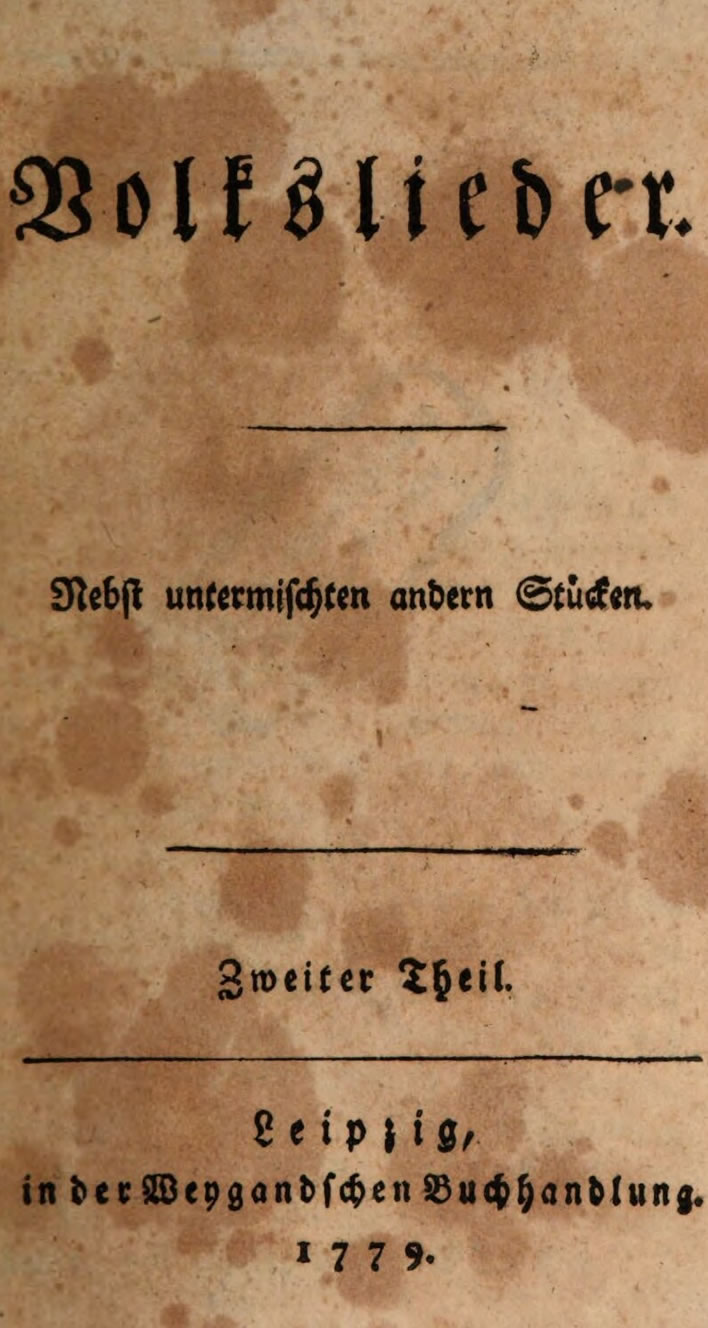
Johann Gottfried von Herder, Volkslieder, Leipzig, Weygand, 1778-1779. Title page. This book also contains Herder's 'Röschen auf der Heide' (Book II, p. 151), a precursor of Goethe's 'Heidenröslein'. Image: Österreichische Nationalbibliothek.
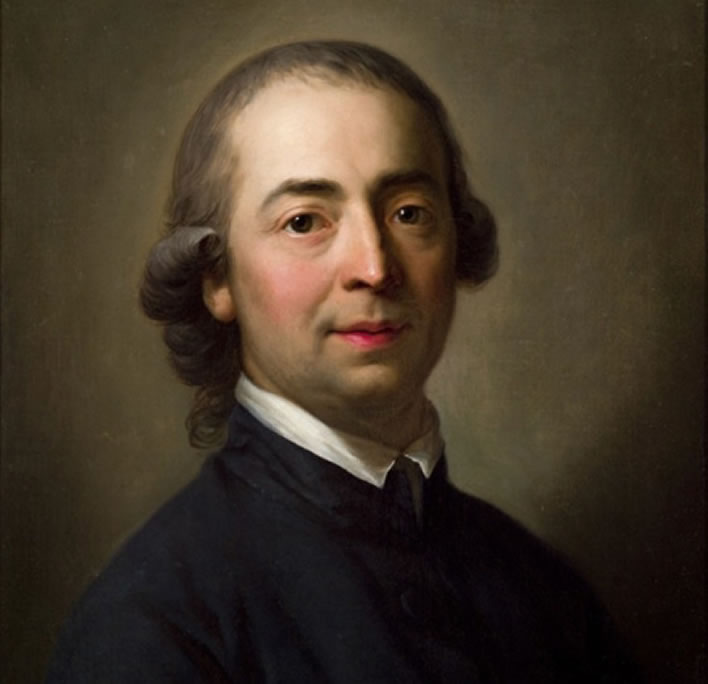
A portrait of Johann Gottfried Herder by Anton Graff (1736-1813), c. 1775. Image: Gleimhaus Halberstadt, Porträtsammlung Freundschaftstempel. Online.
The poem certainly looks simple at first glance. Thanks to that superficial accessibility, its innate charm and the many musical settings of it (Schubert's is only one in a crowded field) the poem is anything but some recondite masterpiece – it is familiar to nearly every child who has had a German-speaking education, many of whom will still have at least some of it by heart. It is also, of course, familiar to millions across the broad plains of Schubert fandom.
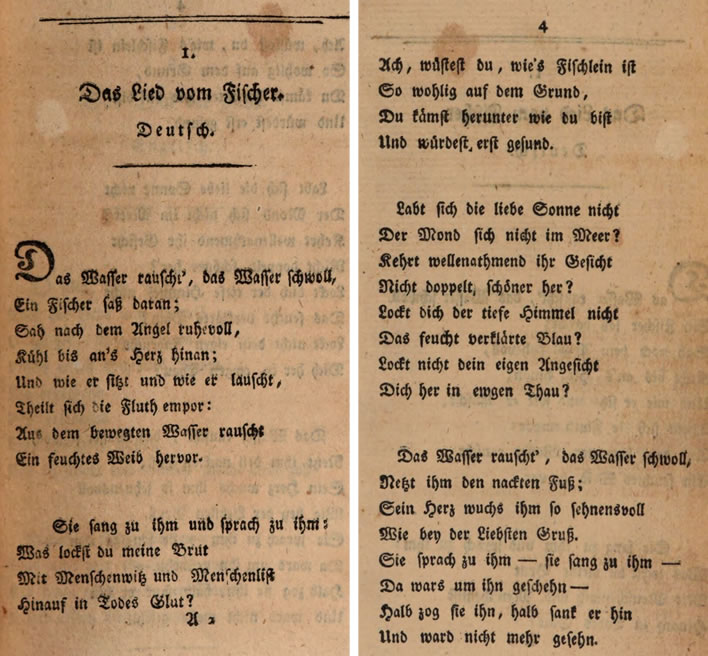
'Das Lied vom Fischer', 1779, p. 3-4. In the register of poems Herder adds: Von Göthe. Es stehet mit der Melodie in des Freiherrn von Seckendorfs Volks- und anderen Liedern. Th. I.'It is to be found in Baron von Seckendorf's Folk- and other Songs. Part I.'. Karl Siegmund von Seckendorff (1744-1785), was Carl August's Directeur des plaisirs, a colleague of Goethe's at the Duke's court in Weimar. Image: ibid.
We shouldn't let familiarity breed contempt, though. It may look and sound like just a charming fairytale, but Goethe's poem is a subject that demands and repays study. It is well worth a deeper look that we hope will enhance, not kill the pleasure in Goethe's text and Schubert's music. Here we go:
Metrics
[For this section on metrics the reader does not need to understand German, the English translations come in the next section]
Der Fischer was written some time in 1778, possibly early in that year. Much of Goethe's later poetry is written within tight, traditional structural constraints – odes and elegies, for example – taken from classical models. In this labour the poet's task was to say something interesting without breaking the model: adherence to the requirements of the formal pattern was essential.
But we have not got there yet. With Der Fischer we are still at a point in Goethe's evolution when metrics could be at the service of meaning and not the other way around, as was later often the case. The poem is therefore a good one to torture children with, since its metrical analysis is full of subtleties that demand some lateral thinking.
Superficially, this 'folk poem' is a ballad and we get the metre that is on that particular tin: a sequence of basic iambic feet (◡—, short-long) which convention says should be arranged in alternating lines of four (tetrameter) and three (trimeter) feet. Here, for the unsteady on their feet (|) is the first stanza in its conventional layout with the iambic feet marked.
Short/unstressed vowels are marked in green, long/stressed vowels in blue:
| 1 | 2 | 3 | 4 |
| Das Was | ser rauscht', | das Was | ser schwoll, |
| Ein Fisch | er saß | daran, | — |
| Sah nach | dem An | gel ruh | evoll, |
| Kühl bis | ans Herz | hinan. | — |
| Und wie | er sitzt | und wie | er lauscht, |
| Theilt sich | die Fluth | empor; | — |
| Aus dem | beweg | t en Was | ser rauscht |
| Ein feuch | tes Weib | hervor. | — |
Yes, it's a ballad, all right. Even the couplet rhyme scheme is as it should be.
On the surface the poem is structured quite unambiguously. Schubert, already a metrical master at 18 years old, saw that he could handle all four stanzas of the poem with a single setting. He managed to get it all on two pages of score.
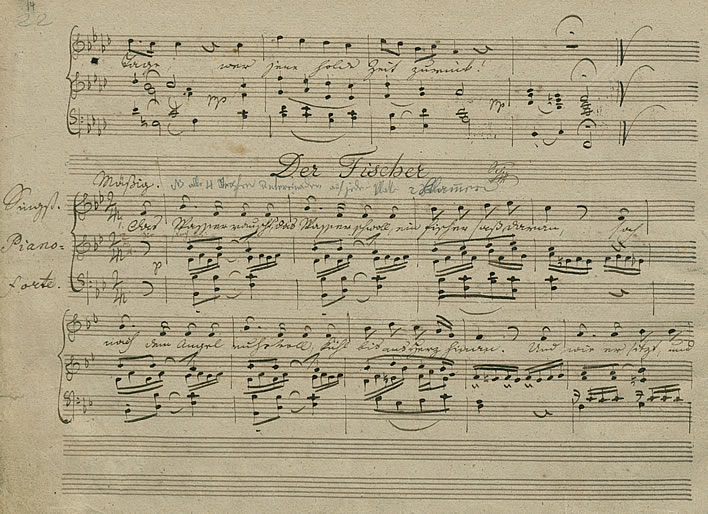
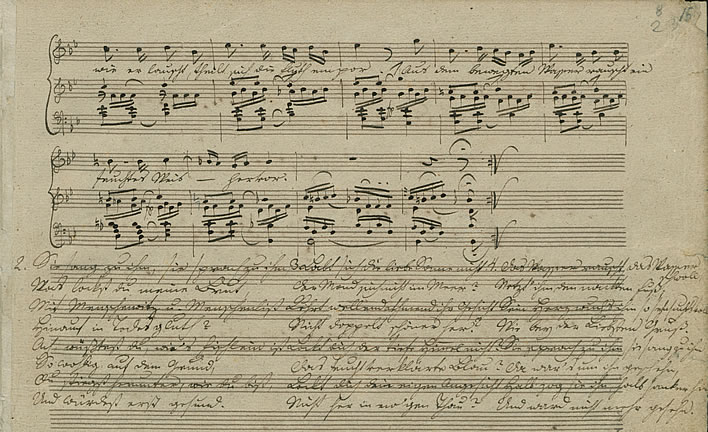
Franz Schubert, 16 Lieder. The fair-copy manuscripts which served as the basis for the first printed editions. Creation some time during 1816.
Contents: Jägers Abendlied p1; Der König in Thule p2; Meeres Stille p3; Schäfers Klagelied p5; Die Spinnerin p9; Heidenröslein p10; Wonne der Wehmut p11; Wandrers Nachtlied p12; Erster Verlust p13; Der Fischer p14; An Mignon p16; Geistes-Gruß p17; Nähe des Geliebten p18; Gretchen am Spinnrade p20; Rastlose Liebe p21; Erlkönig p25.
Image: Staatsbibliothek zu Berlin [Click to display a large image in a new browser tab].
Contrast this with Rochlitz's Alinde (D 904), the musical setting of which the thirty year-old Schubert composed in 1827 – that is, twelve years after Der Fischer – and for which he needed seven pages.
Schubert attained this concision by leaving the real subtleties of Goethe's text to the singer to sort out. The performer is faced with real challenges to understand and to represent the subtleties of Goethe's text. The same facile repetition that makes it easy for classes of schoolchildren to sing the song competently without a lot of tutoring is simultaneously a challenge for professional performers.
Dietrich Fischer-Dieskau, to whom we defer on such matters, says essentially the same thing as we do about Der Fischer but from a musical, not a textual, point of view:
It is astonishing how Schubert managed to capture in very simple, repeating stanzas the natural feeling of the lines. Even without any connection to the text this music has its effect. If one plays just a few bars as purely instrumental music, for example alongside Zelter's setting, the inner beauty of the Schubert style is revealed; the fact that Goethe's designation of the poem as a ballad is completely ignored changes nothing.
Es verwundert, wie Schubert es fertigbrachte, in sehr einfachen, immer wiederkehrenden Strophen die Naturstimmung der Verse ganz einzufangen. Auch ohne jede Beziehung zum Text würde diese Musik wirken. Spielt man die wenigen Takte als reine Instrumentalmusik, etwa neben der Zelterschen Fassung, dann wird die innere Schönheit des Schubertstils offenbar; daran ändert auch die Tatsache nichts, daß hier Goethes Bezeichnung »Ballade« völlig ignoriert wird.
Dietrich Fischer-Dieskau, Auf den Spuren der Schubert-Lieder, Brockhaus, Wiesbaden, 1971, p. 59.
Our thesis is therefore that Schubert's melody is an empty sheet upon which the performer must write that which is particularly Goethe about the poem. Singers have to sing both the music and the text responsively. An understanding of the metrics of the poem will make these windy statements clearer – or so we hope.
Pimping the ballad
We can reformulate Fischer-Dieskau's remark about 'ignoring the ballad form' into a simple question: if it is a ballad, why doesn't the metre hop along – da-DUM da-DUM da-DUM da-DUM – in the same way it does in most other ballads? The answer lies in Goethe's subtle use of the interplay of those two powerful opposites, enjambment (running across line breaks) and caesura (a pause within a line).
If we write Goethe's poem in a way that reflects these opposites and not the breaks of the conventional line structure, things become much clearer. Admittedly, doing this mangles the written lines and therefore mangles the counting of the metric feet – but we have already done the foot-counting thing.
As before, short/unstressed vowels are marked in green, long/stressed vowels in blue, but now each line ending is a caesura. Even if you don't read German, you can clearly see the ebb and flow of churning water in the structure – even more so if you stand a little back from the screen:
Das Wasser rauscht',
das Wasser schwoll,
Ein Fischer saß daran,
Sah nach dem Angel ruhevoll, Kühl bis ans Herz hinan.
Und wie er sitzt
und wie er lauscht,
Theilt sich die Fluth empor;
Aus dem bewegten Wasser rauscht Ein feuchtes Weib hervor.
Sie sang zu ihm,
sie sprach zu ihm:
Was lockst du meine Brut
Mit Menschenwitz und Menschenlist Hinauf in Todesgluth?
Ach wüßtest du,
wie's Fischlein ist
So wohlig auf dem Grund,
Du stiegst herunter wie du bist Und würdest erst gesund.
Labt sich die liebe Sonne nicht,
Der Mond sich nicht im Meer?
Kehrt wellenathmend ihr Gesicht Nicht doppelt schöner her?
Lockt dich der tiefe Himmel nicht,
Das feuchtverklärte Blau?
Lockt dich dein eigen Angesicht Nicht her in ew'gen Thau?
Das Wasser rauscht',
das Wasser schwoll,
Netzt' ihm den nackten Fuß;
Sein Herz wuchs ihm so sehnsuchtsvoll Wie bei der Liebsten Gruß.
Sie sprach zu ihm,
sie sang zu ihm;
Da war's um ihn geschehn:
Halb zog sie ihn,
halb sank er hin,
Und ward nicht mehr gesehn.
It is the caesurae and the enjambments which are responsible for the almost subliminal ebb and flow of the metre, emphasising the poem's watery theme. This is the rhythm that everyone hears but no one notices, because it gets lost in the conventional printed layout of the poem.
Once again, we see Goethe in a class of his own in German versification: whereas mediocre poets are happy to get their poems just to scan, he takes his metrical effects to a much higher level. The man was a genius. Once again we see Franz Schubert's tremendous lyrical and metrical intelligence at work, the sensibility that allowed him to perceive that this 'ballad' was not really a ballad at all, and to put that perception into a musical form. The man was a genius.
Those who still think that the idea of the importance of caesurae is just another unproven, probably drink-fuelled fantasy from the mind of your author should consider the line in the second stanza Sie sang zu ihm, sie sprach zu ihm. In the earliest editions of the poem (among them the Herder edition reproduced above) this line was Sie sang zu ihm und sprach zu ihm. The later replacement of 'und' with ', sie' served to enhance the caesura at this important point in the action.
In the earliest editions, too, in the last stanza, the similar line is repeated but with three massive, unmissable caesurae: Sie sprach zu ihm — sie sang zu ihm — Da wars um ihn geschehn — Halb… (see again the Herder edition reproduced above). The climax is reached in three substantial thrusts – whether of waves, or the water sprite pulling the angler or… well, whatever, Dr Freud.
It seems that at the same time the caesura in the first instance of the formula in the first stanza was strengthened, these three rather overwhelming caesurae in the fourth stanza were pulled back and orthographically harmonised with the first instance: Sie sprach zu ihm, sie sang zu ihm; Da war's um ihn geschehn: Halb…. This change has the advantage of highlighting the symmetry between the two occurrences and reinforcing the important dichotomy: sang|sprach, sprach|sang. The very explicit caesurae are still there, although now represented in the same manner as they are implicitly represented in the rest of the poem.
Schubert himself was a master of the caesura. Here the ceasurae must be treated not as pauses but as slight, barely audible hesitations. Don't overdo it, though. Nor should singers present their audience with that material unknown to modern science: 'Waaaaaasser'.
Analysis and interpretation
Yes, very nice… nice poem… but what does it all mean?
Der Fischer
Das Wasser rauscht', das Wasser schwoll,
Ein Fischer saß daran,
Sah nach dem Angel ruhevoll,
Kühl bis ans Herz hinan.
The Angler
The water rushed, the water swelled, an angler was sitting alongside, watching the rod peacefully, cool to his heart.
Well, that burst of interpretative activity didn't get us very far – just the first four lines. We are in the presence of genius here, so we will have to take things slowly.
Setting the scene
Firstly, it is a sign of Goethe's special genius that he has the courage to throw his readers straight into the middle of the action. Lesser poets would have done some scene setting, such as 'an angler sat on the bank of a turbulent river'.
Who are we thinking of here? – go on, you know – that's right, Christian Friedrich Daniel Schubart opening his poem Die Forelle: 'An einem Bächlein helle', 'At the side of a clear stream'. Schubart was a competent journeyman poet, though rococo-mimetic, and, as our readers well know, it was Franz Schubert's melodic genius that turned Schubart's Die Forelle into something quite exquisite.
But Schubart was not Goethe. It would never have occurred to Schubart, embedded as he was in the conventions of baroque poetry, to simply throw his readers right into the middle of the action in the very first line of a poem.
Goethe accomplished the scene-setting of the first four lines with astonishing economy – without any explicit scene-setting in fact. The title plus the first two lines tell us almost everything about the current situation; lines 3 and 4 add the contemplative mood. We note the perfect balance of the turbulent, noisy water and the inner peace of the fisherman.
As we shall see in due course, Goethe once maintained that Der Fischer was 'about water'. It is a common characteristic of Goethe's lyrical poetry that the really important bit comes in or at least very near to the first line. Readers will think of that other classic Goethe/Schubert pairing, Heidenröslein, 'Sah ein Knab' ein Röslein stehn', 'A youth saw a rose standing'. There you have it, bang! right in the first line: 'boy|rose'. In that case the title of the poem was the name of one of the participants, the meadow rose; the present case is no different: the angler.
While we are at it, we note too that in Goethe's final text the title is simply and laconically Der Fischer. That's sufficient. The change makes us realise how flatulent the title in Herder's collection was: Das Lied vom Fischer, 'The song about the Angler'. But, of course, our interest is in the angler, not the song.
Rauschen
The two opposite states presented in the first four lines, turmoil and stillness, are held together by the verb rauschen.
Those with no German will be puzzled reading such pretentious nonsense and think badly of me; native speakers of German, however, will know what I mean immediately, because it arises from the multiple meanings of rauschen and its related forms.
This is not ambiguity – it is 'layering' or 'echoing'. In the immediate context of the first line, rauschen clearly applies to the noise of rushing water, for which we have no equivalent single word in English. As a noise, it means a loud, continuing 'white' noise, such as that made by water rushing over rocks or over a weir – not thundering as a waterfall, but continuous 'water noise'.
The word can also be used in the sense of 'to rush' or 'to hurry' (of things, animals or people) as well as the noise such movement makes (wind in the leaves, wings in the air) and ultimately any source of noise – even footsteps – meaning that we might find both meanings – noise and motion – subsumed in the rauschen of our noisy water.
The third meaning we can summarise in English in the word 'intoxicate'. The origin of this particular meaning suggests the noisy behaviour of humans drunk on alcohol as well as animals in the breeding season drunk on hormones. Developing along its independent lines, rauschen and der Rausch became used for any kind of intoxication, not just the noisy sort, for example 'charmed', 'enchanted', 'mesmerised' or 'beguiled'. These days, now that enchantments are so passé, the German speaker thinks of Rauschmittel: stuff to get high on.
Attentive and careful readers of the German text will have already started to supect after reading only these first four lines that the master of language Goethe is playing with us. He has set up a dichotomy in which the tumbling waters are rushing noisily past and, in complete contrast, the angler is sitting in almost trance-like state. 'Trance', did I say? Did I mean a Rauschzustand, a 'state of intoxication', perhaps even as 'stoned' as the rocks he is sitting on?
In earlier usage rauschen could be a verb describing the act of intoxicating ['something', when used transitively]. Nowadays we would use the word berauschen, to 'intoxicate' or 'cast a spell' on someone. It is indeed a shadow meaning, but it is there, nonetheless, that Das Wasser rauscht we might read as 'the water intoxicates'.
Schubert fans reading this will be looking smug, for they knew all this already. They will recall our extensive discussion of the poem Wohin from the Müller/Schubert cycle Die schöne Müllerin and the use of rauschen and berauschen in the context of another stream and the water sprites that sing in it. They will also remember another case we mentioned there of the pure noise of rauschen discussed on that occasion, the swish of a sickle through grass.
Why are we following all these byways? Patience! – as we trudge our way through the poem all will become clear.
Still on the first line – you really don't want us to rush, do you?
[Ah, 'rush', no etymological connection to rauschen, unfortunately. It is a word with French roots, as the otherwise harmless drudges at the OED tell us. For our present purposes we armchair etymologists with hyperactive imaginations would prefer 'rush', if it has to be derived from French, to be descended instead from the French word ruisseau, a '(shallow) stream', not ruser, a 'ruse' or 'to rush an opponent'. The wise ones shake their heads – stony-faced pedants, the lot of 'em!]
The manifestation of the god
So, still on the first line, we should spend a moment on schwoll, 'swelled up', a testament to Goethe's visual imagination and structural sensibilities. Even native speakers of German will read schwoll and think not much about it: perhaps water rising or flooding.
But when we do think about it, schwoll seems an odd word to use here – a nice melodic word, but an odd one: is our angler in danger of drowning in an imminent flood? We find the answer to this puzzle in the next four lines:
Und wie er sitzt und wie er lauscht,
Theilt sich die Fluth empor;
Aus dem bewegten Wasser rauscht
Ein feuchtes Weib hervor.
And while he was sitting there and while he was listening the water rose up and divided; from the churning water a wet woman emerged.
Now we realise that the water had 'swollen up' because of what was underneath it. The swelling is the precursor of the appearance of the water sprite, the 'wet woman'.
The self-flagellating readers who have dipped into the American poet Ezra Pound's magnum opus The Cantos will have encountered many situations in which a divine manifestation is heralded by some precursor hinting at the imminent presence of some god or other.
Goethe and Pound, Weimarer Klassik and American Modernism, only 150 years between them – why not? They were both pantheists (although Goethe didn't make too much of it, given his elevated status and the religious sensibilities of his time). Goethe's works are full of spirits of earth and sky, field, wood and stream. In Heidenröslein we listen in to a conversation between a boy and a rose. In the present case we have a water sprite bewitching a human.
But first things first. Our sense of the intoxicated, enchanted state of the angler was strengthened by the first line in this section wie er lauscht – the angler is actively listening, lauschen, to the rauschen, let's call it the 'whispering' or 'murmuring' of the rushing water.
In order to receive the message and be prepared for the manifestation the angler has to be in a receptive state – just wandering along the bank of a stream is not sufficient: 'He that hath ears to hear, let him hear'. The trance-like state is now fully defined, the precursor, the swollen water, has appeared and we are now ready for the apparition that is about to become manifest.
The wet woman
The water that was merely 'swollen' in the precursor state now rises up and bursts apart, theilt sich die Fluth empor, 'the water rose up and divided', and there emerges a feuchtes Weib, a 'wet woman' – how on earth can we translate that into English?
Native speakers of German will roll feuchtes Weib around their tongues and smile with pleasure at Goethe's audacity. Goethe turns the speech mannerisms that lesser writers would put into their concocted Volkslieder, their 'folksongs', into a formulation that will make his sophisticated readers – even the stuck-up delicates of the court in Weimar such as Herder (who published the poem) – sit up and pay attention.
Unlike mediocre writers he does not explain or digress at this astonishing point; he does not categorise this 'wet woman' by telling us, for example, that she is a Nixe, a 'water sprite'; he remains totally, astonishingly objective. There speaks Goethe, the observer of nature, the amateur scientist, the collector of rock samples: before us is a 'wet woman'. And that is how we shall translate it in English.
Goethe is playing with us in other ways: he gives us here a second rauschen, this time in one of its other meanings, 'rush'. The water sprite does not glide, or slide or emerge into the human world, she bursts from the water in her own cascade of motion. It should be a Vorticist/Futurist painting: 'Wet Woman bursting from Stream'.
This must be one of the few German poems that is cited in the Grimms' dictionary for the use of the same word, in this case rauschen, in two distinct meanings in the same poem.
Rhetoric and incantation
The next two stanzas – half of the four stanzas of the poem in total – offer the argumentation used by the water sprite to persuade the bewitched angler to enter the water. We note in passing that the angler never speaks in this poem – unlike, for example, in Heidenröslein, in which we hear a dialogue between the two participants. All the talking is done by the wet woman.
These are the passages where German-speaking schoolchildren can pick up lots of points in their interpretations, and sensationally so the swots who can analyse the wet woman's speech using the traditional five 'canons' of classical rhetoric. Goethe could do that, but we shall leave it for another time and a slow day in the Figures of Speech editorial offices.
Sie sang zu ihm, sie sprach zu ihm:
Was lockst du meine Brut
Mit Menschenwitz und Menschenlist
Hinauf in Todesgluth?
Ach wüßtest du, wie's Fischlein ist
So wohlig auf dem Grund,
Du stiegst herunter wie du bist
Und würdest erst gesund.
She sang to him, she spoke to him: what are you doing, luring my brood with human cunning and human tricks up to a fiery death? Oh, if only you knew how happy the little fish is down on the bottom of the stream, you would climb down just as you are and only then would you finally be healthy.
The first of these two stanzas offers easy pickings for schoolchildren: if your teacher is not a grammar pedant but a Green hippy – and which ones aren't these days – you just need to crank the handle on the 'humans are evil' meme, Menschenwitz und Menschenlist, 'cunning and trickery', and contrast that to the happy, uncomplicated state of the fish on the riverbed, an existence that is 'healthy'. At one with nature, we might say.
We now realise how cleverly Goethe has prepared us for this speech in his description of the state of mind of the angler in the first few lines of the poem, Kühl bis ans Herz hinan, 'cool to the depths of his heart'. The state of enchantment began there – the use of the word kühl, 'cool' as an expression of contentment and receptivity was striking. Now we realise why this slightly unusual word kühl was used, expressing the contrast between the cool natural world beneath the surface and the Todesgluth, the 'glowing embers of death'. In his cool heart, listening to the Rauschen, the angler is almost there.
The deep heavens
For the second of the two stanzas containing the argumentation of the water sprite, Goethe uses a metaphor of the heavens mirrored in the surface of the water. Schubert fans will yawn knowingly here and recall Schubert's setting (D 933, 1827) of Karl Gottfried von Leitner's poem Fischers Liebesglück (1821), in which the protagonist, a fisherman in a boat at night with his loved one, sails over the water that mirrors the night sky:
Nur Sterne belauschen
Uns ferne, und baden
Tief unter den Pfaden
Des gleitenden Kahns.
So schweben wir selig
Umgeben vom Dunkel,
Hoch überm Gefunkel
Der Sterne einher.
Only the stars listen to us from afar and bathe deep beneath the path of the gliding boat.
So we sway blissfully surrounded by darkness, high above the twinkling stars.
This is not the place for a disquisition on the occurrence of the metaphor of water mirroring sky. We only need to note that the metaphor here is not the more usual one of the night sky mirrored in water, but the daytime sky. Here sun and moon set down into the water and rise up out of it, returning with their faces 'refreshed':
Labt sich die liebe Sonne nicht,
Der Mond sich nicht im Meer?
Kehrt wellenathmend ihr Gesicht
Nicht doppelt schöner her?
Lockt dich der tiefe Himmel nicht,
Das feuchtverklärte Blau?
Lockt dich dein eigen Angesicht
Nicht her in ew'gen Thau?
Don't the gentle sun and the moon refresh themselves in the sea? Don't they return breathing waves, their faces doubly beautiful? Doesn't the deep heaven lure you, the blue transfigured in water? Doesn't your own face draw you into the eternal dew?
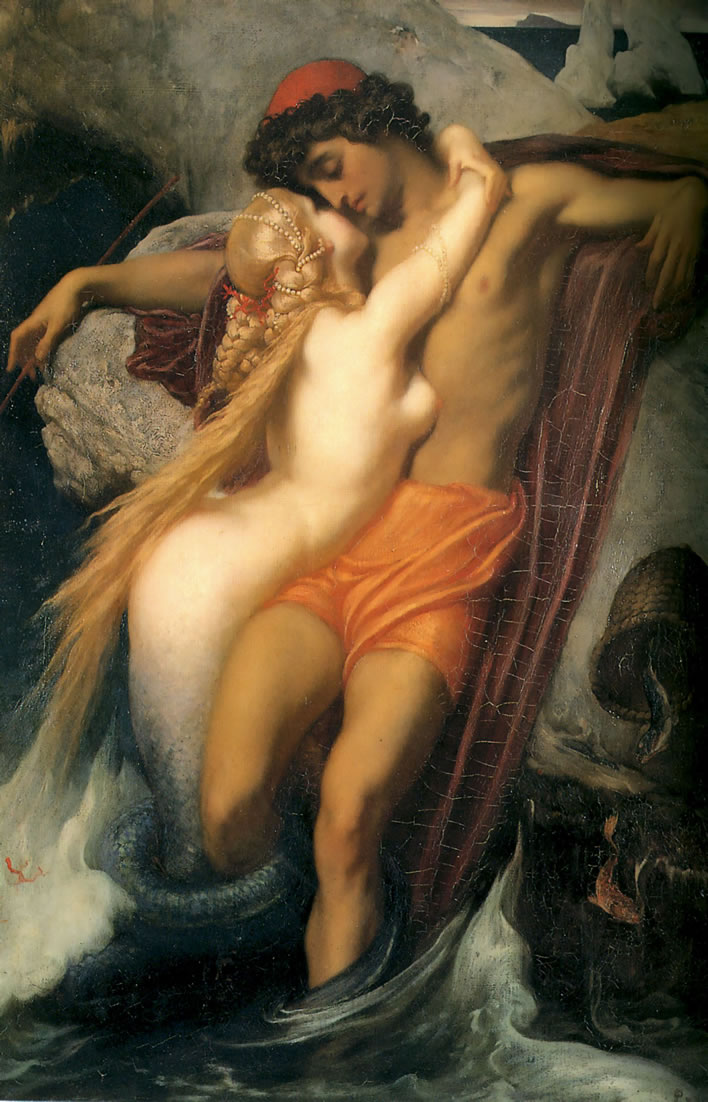
Frederic Leighton (1830–1896), The Fisherman and the Syren, 1856-1858. Fishy tail and very entranced fisherman. Image: Bristol Museum and Art Gallery.
The verb laben is not simply 'to bathe' or 'to refresh' but invokes a process of cleansing, of renewal, involving pleasure and delight, as much for the soul as for the body.
The daytime heavens reflected in the surface of the water are 'deep heavens' – one has to descend to them as one would ascend to their mirror image in the sky. In this mirrored world, the blue sky is feuchtverklärt, 'clarified' 'modulated' or 'transfigured' by water, the 'eternal dew'.
The spirits of the earth
Goethe, the author of Faust and thus always mindful of the Erdgeister, the 'spirits of earth', contrasts the cool spirituality of the two of the four elements, air and water, in which the mind finds health, with the hot degradation of the other two, earth and fire, wherein there is only 'fiery death'.
Narcissus
What to do about the image of 'your own face' which draws you down into the water?
Simple, down-to-earth people might read the reflection of the angler's face as being a reflection of a familiar object that makes the water seem friendly. Goethe is not a simple person, though. He was deeply read in Ovid's Metamorphoses – just that work that is so full of legends of divine manifestations and transformations of state.
Pretentious commenters might tell us that the Metamorphoses 'informs' or 'stands behind' much of Goethe's lyrical work and Der Fischer in particular, and they would not be wrong: Ovid's Metamorphoses permeates this poem as much as it does large sections of Pound's Cantos, almost as a textbook of Hellenic pantheism.
It comes as no surprise, therefore, to find Goethe's wet woman alluding to the legend of Narcissus, a key source for which is Book 3 of the Metamorphoses (lines 405-507).
Lockt dich dein eigen Angesicht
Nicht her in ew'gen Thau?
Doesn't your own face draw you into the eternal dew?
The reflection that Narcissus sees in the glassy surface of the woodland pool is his perennially youthful image, with which he falls in love. His reflection 'draws him in', but every attempt to unite with that image is a failure, until he is ultimately put out of his misery by being transformed into the flower that bears his name.
Furthermore, Narcissus is the offspring of a river god and a naiad, a water nymph, so there are allusions aplenty here for the mythologically and allegorically minded.
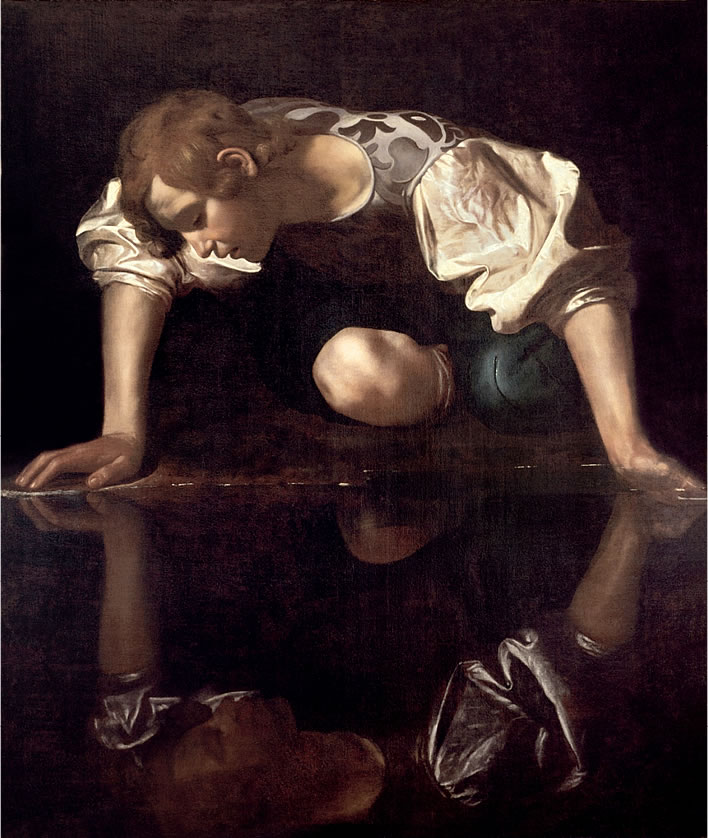
Caravaggio (Michelangelo Merisi, 1571-1610), Narcissus, 1594-1596. Image: Palazzo Barberini.
Unlike pretty-boy Narcissus, who had no way to unite with his younger image, in the present case the water sprite offers just that path. The psychiatrists here will be tickled to note that the wet woman appears not to be the main attraction on offer here, but rather the self-discovery of the narcissist. Tellingly, 'wet woman' is all the description we get of her – we have to use our imagination to probe the damp corners of this apparition. Despite what leering painters like to suggest, there is no hint of lust or sexual attraction in the dealings of the angler and his wet woman.
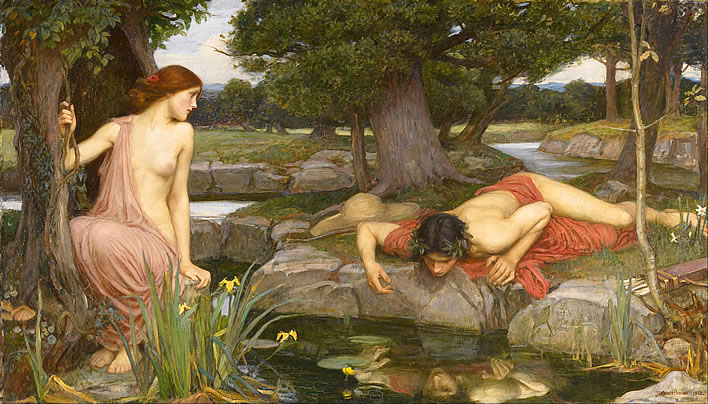
John William Waterhouse (1849–1917), Echo and Narcissus, 1903. Image: Walker Art Gallery.
The moment of submission
In the first stanza we found ourselves in the reality of everyday life, albeit at the beginning of a trance-like state. The second and third stanzas revealed the content of the trance. The fourth and final stanza brings us back to the intersection of trance and reality.
Das Wasser rauscht', das Wasser schwoll,
Netzt' ihm den nackten Fuß;
Sein Herz wuchs ihm so sehnsuchtsvoll
Wie bei der Liebsten Gruß.
Sie sprach zu ihm, sie sang zu ihm;
Da war's um ihn geschehn:
Halb zog sie ihn, halb sank er hin,
Und ward nicht mehr gesehn.
The water rushed, the water swelled and wet his naked foot; his heart filled with longing, as though at the greeting of the loved one. She spoke to him, she sang to him; with that he was done for: she half pulled him, he half sank down and was never seen again.
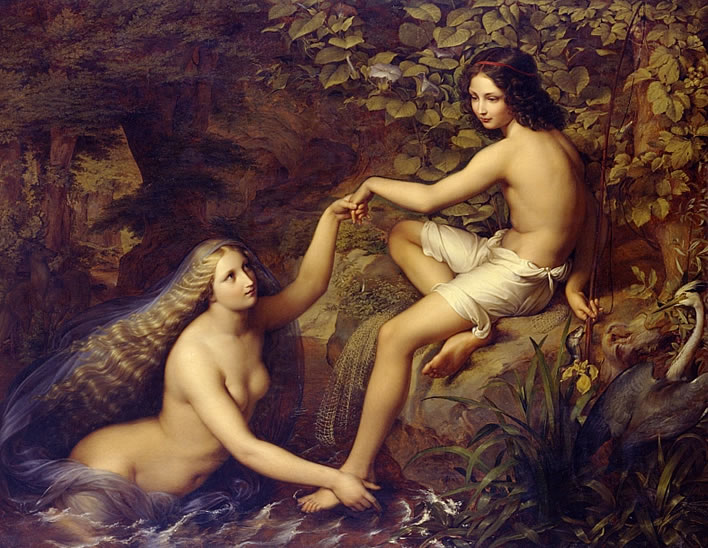
Julius Hübner (1806-1882), Der Fischerknabe und die Nixe, 1827-1828. Image: Nationalgalerie der Staatlichen Museen zu Berlin.
The real world occupies the first half of the stanza and is reintroduced by repeating the formulation at the opening of the poem, das Wasser rauscht', das Wasser schwoll. We have the clever physical interface of angler and water, Netzt' ihm den nackten Fuß, the hint that he is being drawn in to the water.
We are told of the longing that is now in the angler's heart as a result of the enchantment. In Goethe's poetry every word counts and has its particular gravity field. Here we read that the angler's longing is Wie bei der Liebsten Gruß, 'like the greeting of the loved one'. Not 'a' loved one but 'the' – that is, 'his' – loved one. Our angler is therefore not some pimply nerd who spends his evening tying flies in his bedroom, hoping one day to meet a woman (any woman, wet or not). He already has a loved one. He now experiences yet another Ovidian transition, in that the water sprite now speaks to him in the tones of his loved one, displacing and replacing her.
The second half of the stanza returns us to the world of the water sprite, Sie sprach zu ihm, sie sang zu ihm, but this time with speech coming before song, both instances taken together forming reasoned speech bracketed by sung incantation: song-speech-song.
The descent into the water is shared half-half – the angler's death is not really a suicide or a murder, just an assisted transition. And anyway, we should not speak of death, since there is no death here. In a quite Ovidian way the angler has transitioned from one world to another; in the world he left he was never seen again.
Water: dangerously attractive
Well, that's beaten the poem half to death, there can be nothing more to say, really. Can there?
Not so fast: we must not neglect what is taken to be a biographical background for the poem, a tragic event that was no metaphorical transition but a real death.
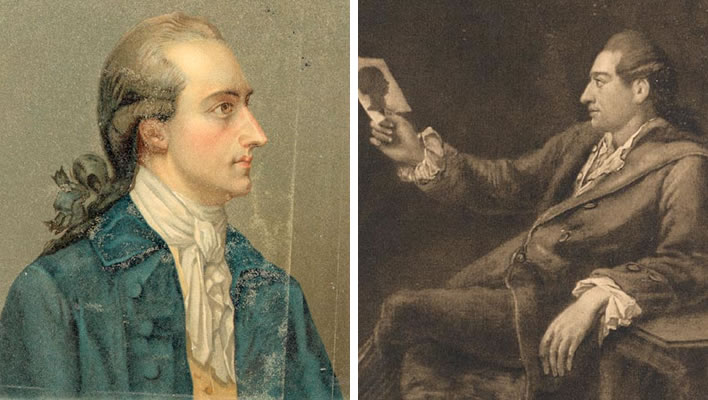
The two images we have of Goethe from his early Weimar years.
Left: Goethe in 1778. The picture is a coloured copy by Prof. Eberhard Ege (1868-1932) of an original by Georg Oswald May (1738-1816) painted in 1779.
Right: Goethe with a silhouette, painted by Georg Melchior Kraus (1737-1806) in 1775-76.
Images: Goethezeitportal.
Goethe wrote Der Fischer sometime in 1778. He was in Weimar at the court of his patron, Carl August, the Duke of Sachsen-Weimar-Eisenach. On or just before 16 January that year one of the ladies of the court, Christiane Henriette von Laßberg, 'Christel', only 17 years old, threw herself to her death from a bridge over the river Ilm in the centre of Weimar. Historical precision demands that we note that no one saw her 'throw herself' (it was a lonely end) – she might simply have slipped on an icy patch. But since all her contemporaries assumed that it was 'throw herself', that is the interpretation we shall take.
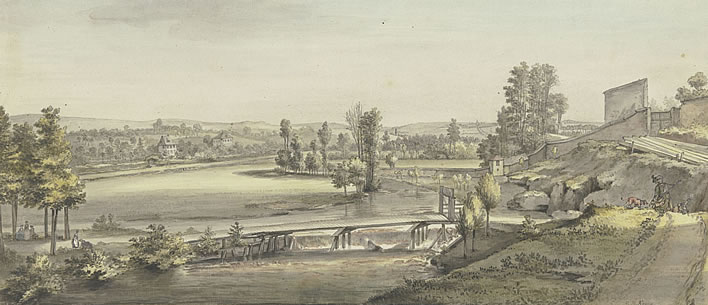
Georg Melchior Kraus (1737–1806), An der Floßbrücke bei Weimar, c.1775–1779. A view closely contemporary with the time of Christel's suicide. Note the lack of railings on the bridge. Image: Städel Museum, Frankfurt am Main.
According to the gossipy chronicles of the Weimar court written by Baron Karl Wilhelm Heinrich von Lyncker (1767-1843), she was one of the ladies of the ballet troupe and the cause of her demise was a passionate involvement with a certain Baron von Wrangel, one of the many scions of that extended, German-Swedish tribe of Wrangels, he being from the Livonian branch of the family.
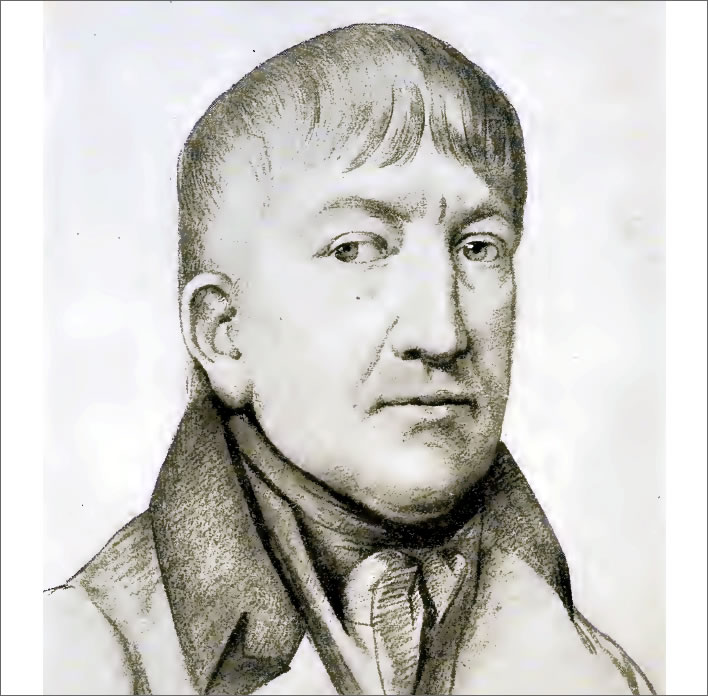
Karl Wilhelm Heinrich von Lyncker (1767-1843) by Johann Joseph Schmeller (1796-1841), 1824. Image: unknown.
Christel was well-known to Goethe: at the time of her death she was taking part in the rehearsals for a play Goethe had written for the theatre in Weimar, of which he was at that time the Director, Der Triumph der Empfindsamkeit, the 'Triumph of Sensitivity', a title offering, in the circumstances, a substantial degree of irony.
Four years previously Goethe had found almost overnight fame – a better word would be notoriety, although there is really no such thing as bad publicity in this literary world – notoriety in German-speaking countries and even other parts of Europe for his Briefroman, 'epistolary novel', Die Leiden des jungen Werthers, 'The Sorrows of Young Werther', published in 1774. In this book the hero, Werther, killed himself rather inelegantly out of passion for a married woman he could not have. The succès de scandale that was Werther arose from the widespread moral and religious objections to suicide.
The novel sparked a predictable craze: clerics and prodnoses of all hues ranted against the work, which is why young men dressed themselves like Werther, mainly to spite them, we imagine. Young, love-struck people across Europe were said to be killing themselves because of the book's malign influence. Werther was the climax of the Empfindsamkeit, 'empathy' or 'sensitivity,' movement in German literature – we discussed this in connection with Klopstock and Haller. The format of the Briefroman was ideal for representing raw mutual emotions without the mediating presence of a narrator.
But now we are in 1778 and that 'Werther madness' has largely fizzled out. The play that Goethe was staging in Weimar, the 'Triumph of Sensitivity' was a heavy-handed satire on Werther and the obsession with feelings upon which it rested – Goethe attacking his own early work, in other words. Irony upon irony: a beautiful, impressionable young girl in the ballet troupe in that play kills herself for love.
When Christel failed to appear for a rehearsal an extensive search found her dead in the icy Ilm. Her body was found in the river by three of Goethe's servants, Seidel, Sutor und Götze, taken to a nearby house and laid out there. Irony upon irony, the house was that of Charlotte von Stein, Goethe's lover at the time.
The wagging tongues of the Weimar courtiers and their ladies claimed that a copy of Goethe's Werther was found on Christel's body. Whether this was true or not doesn't really matter – that the suggestion went the rounds in the social pressure cooker of the ducal court was enough. When von Lyncker retails the story with such frisson, we can be sure it was the topic at every card table and every soirée in Weimar.
Goethe launched himself into manic distraction activity. The day that she was found he, an assistant and a gang of workers, carved out a place in a rock outcrop at a point overlooking the bridge where young Christel had put an end to her sorrows. It was never fully completed: time floods past like the river itself and young ladies of the court are – let's face it – of only passing interest – two a penny, in fact. The project faded with her memory.
On 19 January, Goethe wrote to his mistress Charlotte von Stein:
In place of my person comes a letter. After I left you I was not able to write. There were workers down there and I found an unusual location where the memorial to poor Christel would be hidden from view. That was what I disliked about my idea, that it was on a path on which one can neither walk nor pray, nor love. With Jentsch I hollowed out a sizeable piece of rock, from where one can see in the greatest seclusion her last path and the place of her death. We worked into the night, at the end only I on my own, right until the hour of her death. It was a remarkable evening: Orion was in the sky just as it was when we rode happily from Tiefurth together. […] This beckoning sadness is as dangerously attractive as water itself, and the light of the stars in Heaven that twinkle from both of them lures us.
Statt meiner kommt ein Blätgen. Da ich von Ihnen wegging, konnt ich nicht zeichnen. Es waren Arbeiter unten, und ich erfand ein seltsam Pläzgen wo das Andencken der armen Cristel verborgen stehn wird. Das war was mir heut noch an meiner Idee misfiel, dass es so am Weeg wäre, wo man weder hintreten und beten, noch lieben soll. Ich hab mit Jentschen ein gut Stück Felsen ausgehölt, man übersieht von da, in höchster Abgeschiedenheit, ihre lezte Pfade und den Ort ihres Tods. Wir haben bis in die Nacht gearbeitet, zulezt ich noch allein bis in ihre Todtes Stunde, es war eben so ein Abend. Orion stand so schön am Himmel als wie wir von Tiefurth fröhlich heraufritten. […] Diese einladende Trauer hat was gefährlich anziehendes wie das Wasser selbst, und der Abglanz der Sterne des Himmels der aus beyden leuchtet lockt uns.
[Weimar] d. 19. Jan. 78.
Goethes Briefe.
The Floßbrücke in the Ilmpark in Weimar has undergone a number of transformations down the years. It is now known as the Naturbrücke. Christel's memorial is still there, but integrated into a stone stairway known as the Nadelöhr.
We therefore find Goethe during this frantic labour of distraction musing to Charlotte on the malign power of water to bewilder and to lure humans to their ends, as well as the role played by the reflection of the heavens in its depths.
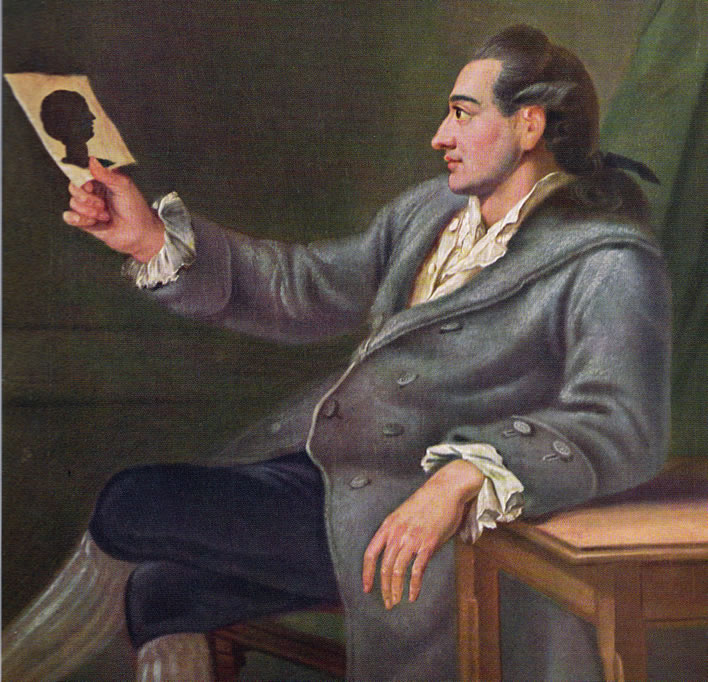
The young Johann Wolfgang Goethe in 1775/76 by Georg Melchior Kraus (1737–1806). This is a photograph of a copy of the original painting made in 1778 for Goethe's parents.Image: Goethe-Museum Frankfurt am Main.
Our psychiatric team would call this displacement thinking, since even if he had not heard the rumours, Goethe, not an idiot, must have been aware of the obvious parallels between Christel's demise and his own depiction of suicide as the inevitable end of high passion, sensitivity and rejected love. Baron von Lyncker hints at as much, albeit in his roundabout, courtier's way of casting aspersions. We can easily imagine the gossip and whispers that the famous commoner and tame court intellectual Goethe had to endure, but von Lyncker drops a heavy hint:
That this event gave plenty of material that could be used to defame the climate of sensitivity in which Goethe's books and dramas had set young people can be well imagined.
Daß dieses Ereignis Stoff genug gab, die empfindsame Stimmung zu schmähen, in welche die Goetheschen Bücher und Theaterstücke die Jugend versetzt haben sollten, läßt sich wohl denken.
Karl Freiherr von Lyncker, Am Weimarischen Hofe unter Amalien und Carl August, Berlin, 1912, p. 66. Online. Lyncker manages to get some important items wrong, even down to Christel's name, so those who read this entry online should also read the correction in the notes.
Now we find Goethe, a short while later, writing in Der Fischer of the dangerous allures of water and the deep heaven of stars reflected in it. It is the mark of the true artist, that nothing that happens is so bad but that it cannot be worked into a new creation.
Goethe in Weimar
Mephistopheles, our devil's advocate, tells us that we shouldn't be so hard on his creator Goethe.
In 1778, three years had passed since Goethe was invited to the Weimar court by Carl August. His appointment to the court offered the recognition that every artist needs as well as financial security. But he remained a commoner for some time – although a trusted advisor he was still a mid-ranking servant in a feudal system which fundamentally cared nothing for learning or literature. He was surrounded and usually outranked by fatuous court groupies with little in their heads and few responsibilities on their shoulders beyond organizing the odd boar hunt. He was merely the intellectual bling of a feudal court.
In contrast to the gentlemen of the court, Goethe was one of the few competent administrators there and was overloaded with work trying to bring the finances of this clown circus of parasites and drones into some rational order. The parasites and drones frequently fought back to protect their comfortable existences. He was a serious man in a very unserious position. It would take another seven years before he was finally ennobled and could look the other courtiers in the eye.
Now, not quite three years into his post, we find him utterly depressed. His Faustian bargain to obtain rank and security as an artist at the court of an enlightened, would-be Renaissance prince had revealed its darker side: he was a commoner at the court of the typical feudal despot of the times, an aristocrat who was concerned essentially with hunting, dining, dancing and philandering. Like everyone else at court he must humour his master, attend to his whims and be on hand to talk to him whenever his lord required some elevating conversation.
A year after the moment of Christel's death he would attempt to counter his Weltschmerz by taking his Duke over the Gotthard Pass in winter. The success of that expedition was temporary: after all the great sights they had seen and the impressive people they had met, once home his Duke quickly rediscovered his old ducal self.
But that was still a year away. Goethe's diary for January of 1778 tells us not only of the events around the death of poor, broken-hearted Christel but of the undertone of depression which was amplified by that shocking event. The first half of January passed with the usual distractions: boar-hunting, sleigh-rides, picnics, dances and dinners. The 16th of January started in the same way:
16— Early pig-sticking competition in the riding course I broke a lance in an attacking boar, just beneath its shoulder ridge. Witzleben's hunters were beaten. Midday with the company to Tiefurt. The thaw prevented a large sleigh-ride. In the evening picnic. Slept at Duke Carl August's. Had days withdrawn into myself with sadness.
17— Cristel von Lasberg was found by my people under the weir in front of the Flosbrücke. She had drowned the previous evening. I was with Duke Carl August on the ice. In the afternoon I was occupied with the dead girl, whom they brought up to Frau von Stein's house. In the evening to her parents. To Cr from the rehearsal.
18— Rode out with Duke Carl August, an hour on the ice. Dined at the court. In the afternoon to Frau von Stein, in the concert at the Stern for a moment. In the evening with Duke Carl August. Knebel came to visit. Knebel stayed with us overnight. Spoke a lot about Cristal's death. Her whole being and her last path etc. Occupied for several days in silent grief at the scene of the death, afterwards forced once again into theatrical frivolity. Various rehersals.
30— The new piece performed on H's birthday.
16 früh Hazze in der Reitbahn mir brach ein Eisen in einem angehenden Schweine, unter der Feder weg. Wizlebens Jäger ward geschlagen. Mittags mit der Herrschafft nach Tiefurt. Das Thauwetter hatte eine grose Schlittenfahrt gehindert. Abends Picknick. bey [*Herzog Carl August] geschlafen. Hatte traurig in mich gezogne Tage.
17. Ward Cristel v Lasberg in der Ilm vor der Flosbrücke unter dem Wehr von meinen Leuten gefunden. sie war Abends vorher ertruncken. Ich war mit [*Herzog Carl August] auf dem Eis. Nachmittags beschäfftigt mit der Todten die sie herauf zu [*Frau v. Stein] gebracht hatten. Abends zu den Eltern. Zu Cr aus der Probe.
18. mit [*Herzog Carl August] ausgeritten, ein Stündgen aufs Eis. an Hof zu Tisch. Nachmittag zu [*Frau v. Stein] einen Augenblick in Stern ins Conzert. Nachts mit [*Herzog Carl August]. Knebeln herüber. Knebel blieb bey mir die Nacht. Viel über der Cristel Todt. Dies ganze Wesen dabey ihre lezten Pfade pp.
In stiller Trauer einige Tage beschäfftigt um die Scene des Todts, nachher wieder gezwungen zu theatralischem Leichtsinn. Verschiedene Proben :|
Den 30 zur H. Geburtstag das neue Stück.
Tagebücher, 1778, Januar.
We are reading the diary of a lonely man who was surrounded with people – lonely even with such close friends such as Karl Ludwig von Knebel (1744-1834) in the vicinity. Two weeks of a life marked by social frivolity, which continued largely unaffected by the death of an aristocratic chorus girl.
If Werther had been one of the markers of the German literary era of Empfindsamkeit, 'sensitivity', we now find its author partaking of the sensitive pastime of pig-sticking and the superficial pastimes of court life in Weimar. And he is in the middle of putting on a play to entertain the frivolous, mocking just that sensitivity.
Christel was quickly forgotten in the occupational therapy of court life. Her suicide was seemingly not allowed to have any impact on the noble Baron von Wrangel or his family.
The stigma attached to suicide let her unfortunate death fade quickly from memory. Remarkably quickly, as Goethe's diary told us: the day after the discovery of her body there was riding and dining and there were concerts as usual.
Goethe's Ur-Freund Knebel seems to have been the only one with whom he could talk about her. Even Goethe's mistress, Charlotte von Stein, does not seem to have been the right sort of soulmate for such a conversation. The project of Christel's memorial was never completed.
Goethe's pious occupational therapy of erecting a memorial to Christel speaks well of him, but we cynical moderns are left wondering what that was all about.
In life he seems to have had no connection with the pretty young dancer, she wasn't even in his troupe of actors – the ballet troupe was under the direction of Karl Siegmund von Seckendorff (1744-1785), Carl August's Directeur des plaisirs. We suspect, though, that whether Goethe's Werther was found on her or not, the connection was there in the mind of its author and induced in it feelings of guilt. What other explanation can there be for this sudden frenzied hollowing out of a stone memorial, away from the paths of other people, deep into the night? What other explanation for his being 'occupied for several days in silent grief at the scene of the death'?
You may believe that Christel's love affair with 'Baron von Wrangel' was just one of the many apparitions floating around in von Lyncker's gossipy mind, as unreliable as much of the rest of his phantasmagoria. You may think that Goethe's manic displacement activity points at a closer relationship between the writer and the showgirl. Well, think away – some real evidence would be nice, though – and there isn't any.
We read in Goethe's account that poor Christel's body was found 'under the weir in front of the Flosbrücke', a place where even in winter the water would rauschen, a turbulent, noisy death. A weir is a specially dangerous place in a river: the falling water generates rotating currents under the surface which drag and hold objects down – even good swimmers can die in that grip. Her body was recovered and taken to Charlotte von Stein's house, where she was laid out – a true feuchtes Weib. Can we see the elements of Goethe's poetic imagination coming together? Who knows?
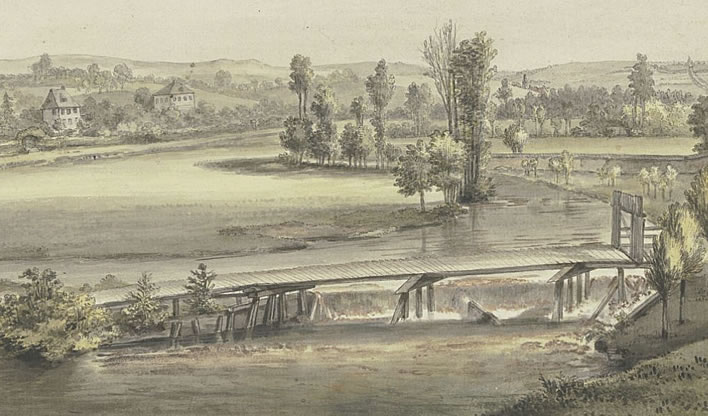
A detail from Georg Melchior Kraus' illustration An der Floßbrücke bei Weimar, 1775-1779, showing the bridge in more detail, its lack of railings and the turbulent weir just beneath it. Image: ibid.
We respond to Mephistopheles, our devil's advocate, by saying that all that he says about Goethe is indeed true – he was a sensitive chap, a serial flirt with lots of what we now call emotional intelligence. But there was something demonic about that too, since Goethe seems to have been able to switch it on and off at will.
In all his tears and agonising over poor, dumped Christel, Goethe was just as capable of dumping his lovers as Baron von Wrangel seems to have been. Goethe's biography has its share of brutally dumped women: Friederike Brion in Sessenheim near Strasbourg in 1771, Barbara Schulthess in Zurich in 1797, to name but two. He left them both without even saying goodbye. His feelings of regret only came some time after, when the jilted ones told him exactly what they thought of him.
Der Fischer
We can therefore quite reasonably understand the origin of at least some of the main elements of Der Fischer in the events of that time in Weimar. The poem is not the account of the biographical event of Christel's suicide, but it is informed by it in clear, though oblique, ways.
It was Siegmund von Seckendorff, the Directeur des plaisirs in Weimar, who had the first shot at composing and publishing a musical setting for Der Fischer. This was in 1779, 18 years before Schubert was even born. Our musical readers can judge what Seckendorff made of it:
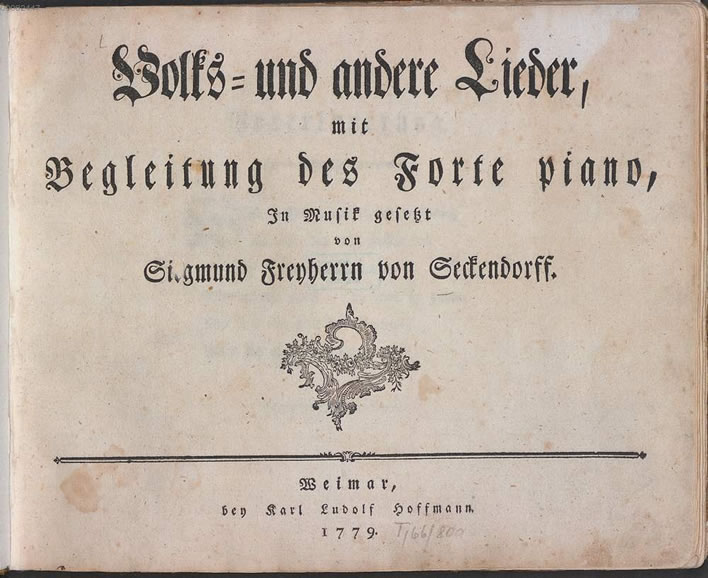
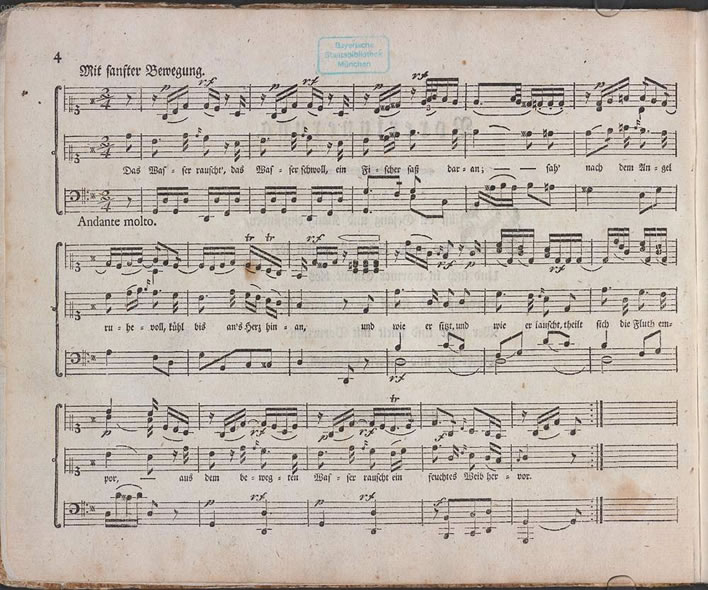
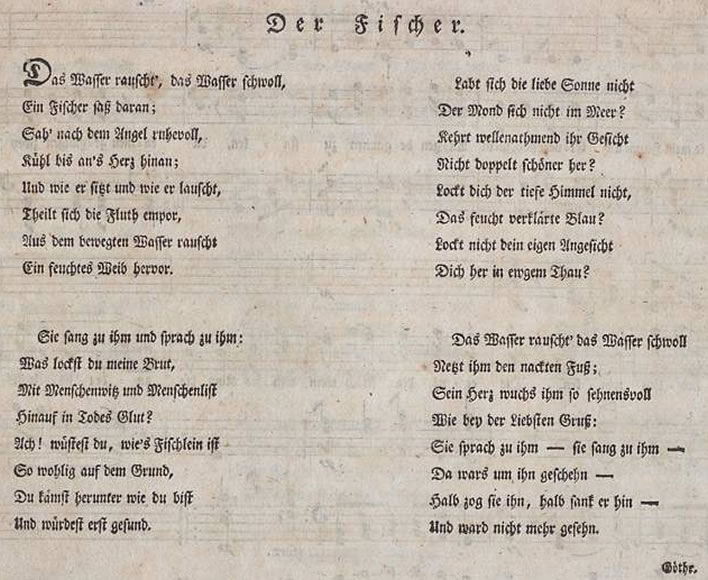
Seckendorff, Karl Sigmund von: Volks- und andere Lieder, mit Begleitung des Forte piano, In Musik gesetzt von Siegmund Freyherrn von Seckendorff , Bd.: 1. 1779. - 29 S., 1779. Images: Bayerische Staatsbibliothek. [Click to open a larger image in a new browser tab.]
Herder used Seckendorff's text as the source for his reproduction of the poem in his Volkslieder in the same year, but seemingly changed the title for some reason to the clunky Das Lied vom Fischer.
What the glittering ones at the court of Carl August made of it – if they even noticed it at all – is unknown. Lyncker, the gossipy page, mentions nothing of it, of course, even though Goethe's poem and Schubert's song outlasted all the courtiers and drones and their courtly fripperies.
The feeling of water
Goethe's displacement therapy about Christel's suicide strengthened over the years. He was a master at displacement thinking anyway, as anyone who reads his autobiographical work Dichtung und Wahrheit will soon realise.
In the case of Der Fischer we have an account from 1823 in which the now 74 year old Goethe, at the pinnacle of his fame and respectability, looked back on that poem written in 1778 by his 29 year-old self. A conversation reported by his dogged young worshipper, Johann Peter Eckermann (1792-1854), tells us by its dissembling nonsense just how well 45 years of displacement therapy had done its job:
'Only a few artists,' he continued, 'understand this point and know how to cope with it. They paint, for example, my "Angler" and never think that it is not able to be painted. This ballad merely expresses the feeling of water, that lovely thing that lures us to bathe in summer; further than that there is nothing else in the poem, and how can that be painted!'
Die wenigsten Künstler,« fuhr er fort, »sind über diesen Punkt im Klaren und wissen, was zu ihrem Frieden dient. Da malen sie z. B. meinen ›Fischer‹ und bedenken nicht, daß sich das gar nicht malen lasse. Es ist ja in dieser Ballade bloß das Gefühl des Wassers ausgedrückt, das Anmuthige, was uns im Sommer lockt, uns zu baden; weiter liegt nichts darin, und wie läßt sich das malen!«
Johann Wolfgang Goethe, Gespräche, 1823, 3. November.
Well, the poem in question does indeed open with the key object das Wasser, 'water', and, as we have seen, the rhythms and noises of water pervade the whole poem. But to say that water is the only thing in the poem and that it is incapable of objective representation is high-grade nonsense.
Here we encounter one of the less appealing sides of Goethe's old age, his ability to serve up the first nonsense that came into his head and project it largely unopposed because of his enormous authority as the sage of Weimar. What he tells Eckermann here about Der Fischer is not just nonsense, it is the final stage of decades of detaching himself from his early life, from the emotional turmoil of his Sturm und Drang period, from all that Empfindsamkeit, 'sensitivity' and, of course, Werther.
'It's just a poem about water and the way it lures us to bathe in it' – really? Pull the other one, Herr Geheimrat.
Unless, of course, that is all that is left in Goethe's mind, the worn and polished remnant of a memory of a winter night almost half a century before, in that period when the depressed Goethe had 'days withdrawn into myself with sadness'; that night just after Christel's death when he stood on the slippery Floßbrücke and looked up to Orion glittering in the cold sky and looked down deep into the icy water at his feet where Orion was glittering too; standing poised in the great vertigo between that height and that depth made more vertiginous by the rauschen of the weir and the vision of the wet woman, the tormented Christel, pulling him in to join her in a place where he would at last be healed and become whole – gesund.
Now, finally, we understand what he wrote to Charlotte:
This beckoning sadness is as dangerously attractive as water itself, and the light of the stars in Heaven that twinkle from both of them lures us.
Diese einladende Trauer hat was gefährlich anziehendes wie das Wasser selbst, und der Abglanz der Sterne des Himmels der aus beyden leuchtet lockt uns.
Update 12.06.2019
Some trivial errors corrected; final paragraph restored.
0 Comments UTC Loaded:
Input rules for comments: No HTML, no images. Comments can be nested to a depth of eight. Surround a long quotation with curly braces: {blockquote}. Well-formed URLs will be rendered as links automatically. Do not click on links unless you are confident that they are safe. You have been warned!